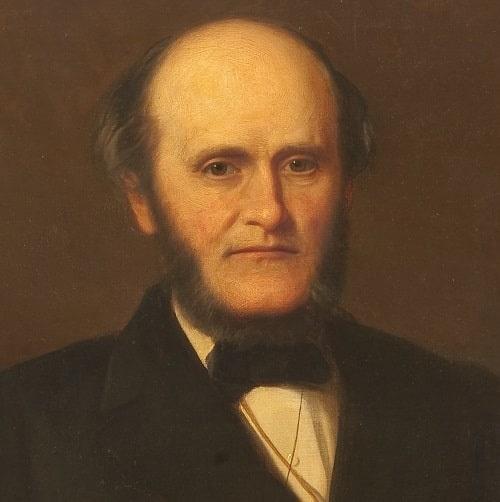Russell Reynolds was born at Romsey in Hampshire, the son of John Reynolds, a nonconformist minister, and grandson of Henry Revell Reynolds, F.R.C.P, physician to the Middlesex and St. Thomas’s Hospitals and Physician-in-Ordinary to George III. His father gave him the greater part of his general education and University College, London, his medical training. He graduated in 1851 as University scholar and gold medallist in physiology, comparative anatomy and medicine. For so outstanding a student, a great future seemed assured. But his means were slender and he decided to begin practice in Leeds where he had relatives. However, his old teacher Marshall Hall persuaded him to return to London, offering him his house in Grosvenor Street on favourable terms. His enterprise was rewarded by appointments as assistant physician to the Hospital for Sick Children in 1855, the Westminster Hospital in 1857 and University College Hospital in 1859. After a further three years, he became full physician and Holme professor of clinical medicine at University College, and in 1867 he succeeded Jenner in the chair of medicine.
Reynolds gave distinguished service to the Royal College of Physicians, being Lumleian Lecturer in 1867, Harveian Orator in 1884, Censor, and finally, from 1893 to 1896, President. He was chosen as Physician to the Royal Household in 1879 and, with his friend, J. E. Erichsen, created a baronet in 1895. He was president of the B.M.A. at the time of his death. But he made his mark in the profession chiefly by his early writings on nervous diseases — he was one of the first to propound the possibilities of electricity as a therapeutic agent — and by his editorship of the System of Medicine, published in five volumes between 1866 and 1879. He was a fluent and popular lecturer and a careful and sympathetic physician. Somewhat shy and grave of mien, he could reveal both a quiet humour and a directness of speech that was no respecter of persons. Painting and music were his recreations, and he was well read in literature. He was married, firstly, to a Miss Ainslie and, secondly to Frances, widow of C. J. C. Crespigny, but left no children. He died at his house in Grosvenor Street.
G H Brown
[Lancet, 1896; B.M.J., 1896; D.N.B., xlviii, 52]

